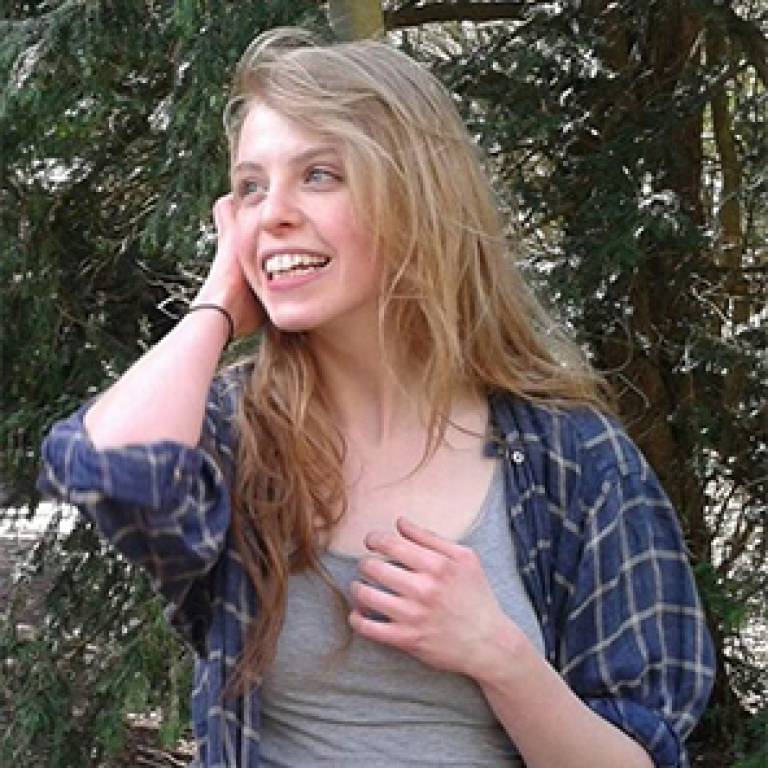Seven questions with Bella Driessen
3 August 2015
This week we put seven questions to Bella Driessen, a Physics BSc student who is also a member of Bentham's Farm, UCL's very own urban agriculture project.

Tell us more about your project:
Bentham's Farm is a student-run, student-founded allotment based outside Max Rayne halls of residence that is open to all UCL students. We meet on a weekly basis to tend to the farm, growing a diverse range of produce using organic methods.
What makes it so important (and interesting)?
In our lifetime, we have already witnessed a global food crisis, and we are becoming increasingly aware of humans' poor nutrition - whether the result of too much, too little or poor quality food - and of the havoc being wreaked by modern agriculture, from deforestation and desertification to small farmers being wrestled out of their livelihoods.
People are starting to take note of the fact that the world's population relies on these small farmers to produce 70% of our food, and the UN Commission on Trade and Development published a new UN farming report entitled 'Wake up before it's too late' in which they point out that small-scale organic farms are the only way to meet the requirements of the growing population in the current environment.
We are a small part of the movement to re-educate people in responsible, sustainable food production by getting muddy in the big smoke.
What has been a personal highlight so far?
A highlight for me was at a recruitment event we held on the farm last September, seeing the scale of enthusiasm about what we are trying to achieve. Enthusiasm is largely what we thrive upon; among us we have some level of experience but the whole project is as much about us learning through shared experience as it is about successfully growing vegetables. So, to see curiosity is a big encouragement!
We've noticed this too through interest
from the UCL Institute of Making, and we're currently getting involved
with the UCL Institute of Sustainable Resources to help with their research.
This really highlights how the project is about re-educating ourselves and working out better ways of doing something we humans have done for millennia, to meet with modern demands.
Explain some of the challenges involved in working on the project.
The main challenge is translating people's curiosity and enthusiasm into action. Students are very spread out around the city, so the farm isn't necessarily local to them, and it's rare that the students remain in the city for the entire year; normally students are absent over the summer when the farm needs to be at its busiest.
I think a message we want to put forward more strongly is that Bentham's Farm is open to everyone, and we're hoping to give people enough information to feel that they can go to the farm alone or with a friend and do some planting, weeding or harvesting outside the organised sessions - this is definitely a goal for next year!
What advice would you give to other students at UCL?
My advice to other students would be - come down to Bentham's Farm! I think there is something very instinctive in humans when it comes to working the land. Nurturing life from a seed is thrilling and therapeutic and something almost all humans have done for millennia, up until very recently; even during the World Wars, some of London's parks were transformed into farmland.
I think connecting with the land is a very necessary part of life, and something that a lot of us lack the opportunity to experience, especially when living in a huge capital city. Hopefully, with projects like this, cities will start filling with vegetables again!
What are your future plans for the project and beyond?
I'm hoping, in the next academic year,
to start a UCLU society connected with Bentham's Farm that can act as a platform
for discussing, confronting and resolving the issues connected with agriculture
and the environment.
It will bring together speakers, thinkers, doers, diggers, musicians, artists and anyone else to promote awareness about the rights of food-growers and proper stewardship of the land.
Apart from giving voice within UCL to these global issues, it will also look to smaller actions closer to home, such as connections with foodbanks and collecting reusable items from students for re-distribution to charity.
Describe your perfect evening (or weekend) after a long week.
Kettle on, water the veg, cook dinner, and eat out in the sun with good company and good music.
 Close
Close

